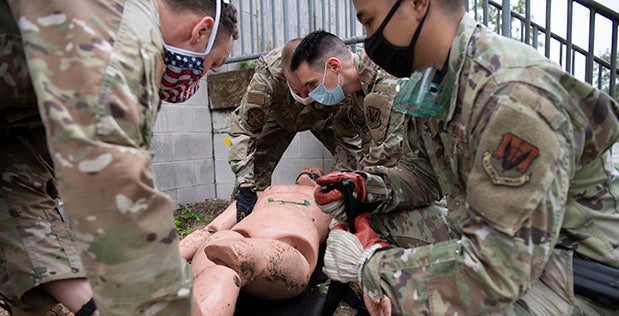Raytheon, Kitware, Parallax, CACI International and the University of Maryland have been selected as performers for the US Defence Advanced Research Projects Agency’s (DARPA) ‘In the Moment’ (ITM) program, a program for the development of artificial intelligence (AI) to make difficult medical triage decisions in austere environments and in mass casualty events.
The selection of these performers was announced in a release from DARPA on 6 June, one that detailed the two-phase approach to addressing challeneges in medical triage using an AI algorithm.
Difficult decisions in medical triage are those where trusted decision-makers disagree, according to Dr. Matt Turek, DARPA’s ITM program manager and deputy director of the Information Innovation Office. Turk describes those decisions as ones where no correct answer exists, and arriving at a course of action is complicated by uncertainty, time pressure, and conflicting values.
The first phase of the ITM program will look at medical triage for small military units in austere environments using AI to make decisions about treatment, while the second phase will consider approaches to using eh technology in mass casualty events.
Raytheon BBN Technologies and Soar Technology, Inc. will collaborate to create decision-maker characterisation approaches that will identify and quantify critical human decision-maker traits in challenging domains.
Kitware, Inc. and Parallax Inc. will create algorithmic decision-makers that match essential characteristics of trusted human decision-makers.
“Key attributes might include how an algorithm evaluates a situation, how it relies on domain knowledge, how it responds to time pressures, and what principles or values it uses to prioritise care,” said Turek.
CACI International Inc. will develop and implement the programme assessment, focusing on how essential human characteristics might contribute to trustworthy decision-making delegation.
“From a technical standpoint, difficult decisions made in medical triage will likely require approaches that do not rely primarily on training data for their implementation, as those approaches can be notoriously brittle,” said Tarek.
The University of Maryland Applied Research Laboratory for Intelligence and Security and the Institute for Defence Analyses will be in charge of policy/practice integration and outreach, with ELSI specialists advising throughout the study process.
Turek predicts that ITM improvements will eventually permit completely automated and semi-automatic decision-making, with humans having the option to veto the algorithm.
In March, researchers at Edge Hill University have launched a new drone project powered by artificial intelligence for battlefield triage. Project ATRACT, which stands for A Trustworthy Robotic Autonomous system to support Casualty Triage, is aiming to create an aerial drone that can aid and speed up triage in the crucial post-trauma minutes that shape survival chances on the battlefield.









